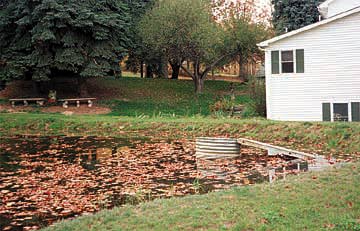 Published Tuesday, Oct. 27, 1998
Published Tuesday, Oct. 27, 1998

WEST SALEM TOWNSHIP
Quake sloshes water table, affecting wells
By Erin Remai
Herald Staff Writer
Some families in the Greenville area don't have enough water, but some have too much.
Ever since the Sept. 25 earthquake that shook Mercer County, some wells' water levels have dropped or dried up completely.
On the flip side, wells thought to be dried up have had life shaken back into them.
"My neighbor called me and said, 'Lee, give me my water back,' " said Lee Gill, of Conneaut Lake Road in Adamsville. Most of the problems have been reported in an area of West Salem Township north of
The spring in Gill's yard, which was enclosed with cut stone in 1882, has always supplied his farm with an adequate amount of water. But since the earthquake, the spring has been overflowing.
"We had plenty before, but now we've got lots of water," Gill said.
Norma Beckdol, of Goetsch Road in Sugar Grove Township, also received a surprise after the earthquake.
"I have an old well in the basement. It supposedly went dry 10 or 11 years ago," Ms. Beckdol said. "When the earthquake struck, it started overflowing."

The pond on the Fay's property on Goetsch Road in Sugar Grove Township still overflows its banks a month after the earthquake shifted the water table beneath the earth's surface, causing the pond to fill. While many residents north of Greenville have lost the water in their wells completely following the earthquake, others, like the Fays, experienced a surge in water. (Erin Remai/Herald)
Ms. Beckdol had a drain put in her basement to alleviate the problem, but soon the well in her yard also overflowed.
Also on Goetsch Road, the Fay family discovered their pond filled unexpectedly after the earthquake.
"Three springs feed our pond, and we were trying to make the pond deeper," Bill Fay said. "The earthquake was at eight minutes to four, and by early evening our pond had filled up."
Fay also said there were several places on his property where water was coming out of the ground. He said at first there was a lot of water, but now it is down to a trickle.
"Apparently the amount of water wells are capable of producing has changed," said Keith Gaspari, president of Chatfield Drilling Inc., Delaware Township.
According to Gaspari, dry wells are a result of a loss of head pressure and the overflowing ones are due to an increase in head pressure.
Gaspari said most of the dry wells are turning up on the ridge that runs between state Routes 58 and 18 north of Greenville and extends into Jamestown and Atlantic.
Gaspari explained that since the earthquake many wells in the area have become artesian, meaning the water level exceeds ground level. "The static levels rise so the water level is above the surface of the ground."
Dennis Risser, United States Geological Survey hydrologist, said it is not uncommon for water levels in the earth to change following an earthquake, but the change usually is not permanent.
He explained that an earthquake "sloshes" the water table, changing the level of water in several places.
"That doesn't explain what people are seeing," Risser said.
The water level in a USGS observation well in Greenville rose two to three feet and has remained at that level since the earthquake, Risser said.
Risser added that hydrologists have just begun to study the water level changes and may have a cause later in the week.

Back to
MAIN EARTHQUAKE COVERAGE PAGE
TOP // Herald
Local news //
Local news headlines //
Herald
Home page


Updated Oct. 26, 1998
Questions/comments: herald@pgh.net
For info about advertising on our site or Web-page creation:
advertising@sharon-herald.com
Copyright ©1998 The Sharon Herald Co. All rights reserved.
Reproduction
or retransmission in any form is prohibited without our permission.


